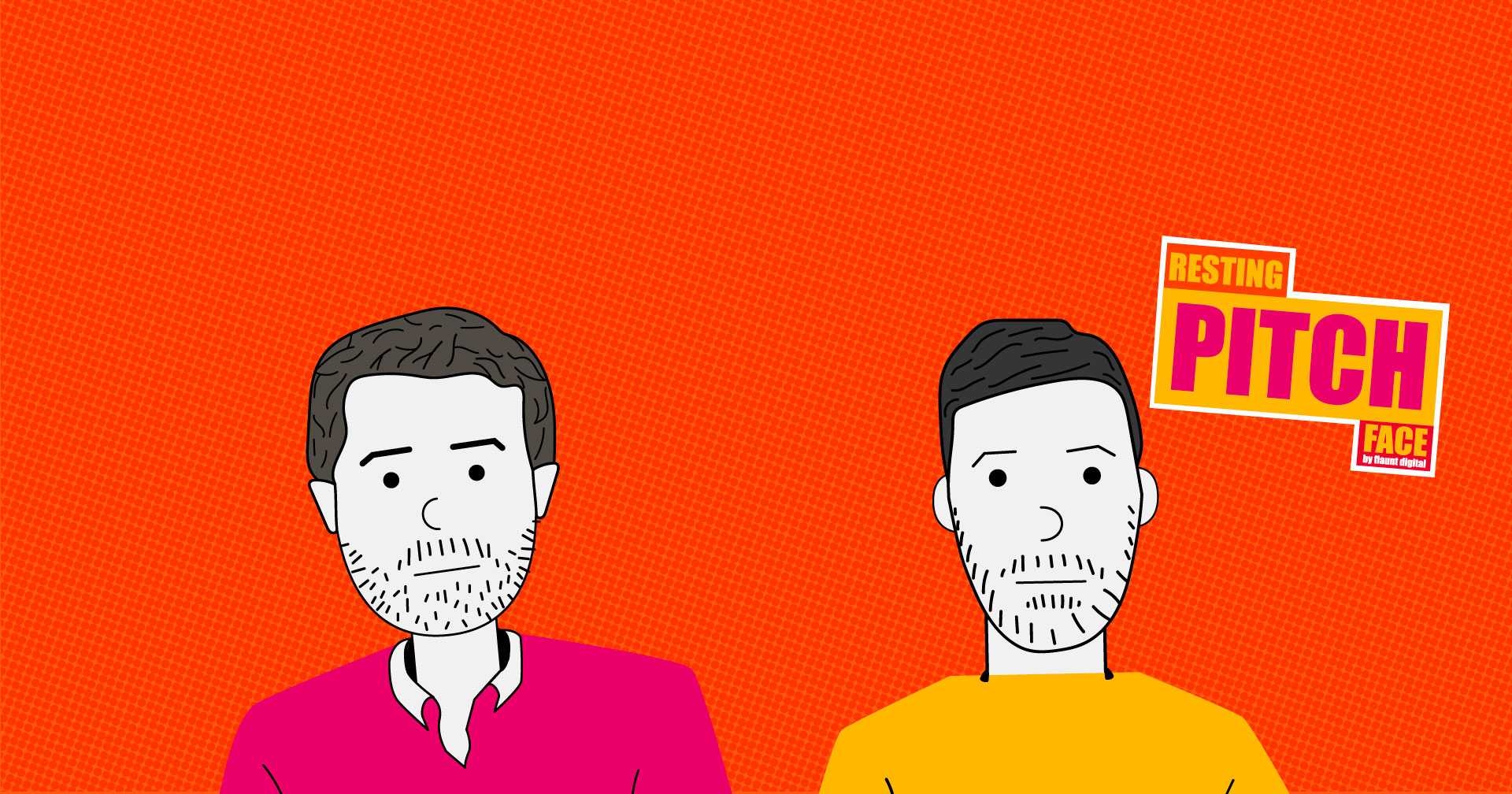RESTING PITCH FACE EP 5: MARKETING SCHOOL
On this week’s episode of Resting Pitch Face, we are talking about all things education.
Lee, Dan and Polly are giving their view on University and whether you need that marketing degree (and three years of hangovers in Dan’s case) to join the agency world.
We’re discussing our own experiences, from traditional education to hands-on experience and why a one-size-fits-all approach is outdated.
Listen on Spotify or Apple Podcasts or subscribe to our YouTube channel for weekly episodes.
See below for a full transcription of episode 5.
VIDEO TRANSCRIPT
Polly: Today I thought it would be good to talk about degrees and university. So, it’s quite hot in the media at the moment. There has been a recent news story that supposedly if you don’t pass your English GCSE, you won’t be able to take out a student loan to go to university. So, there’s been a lot of people talking about one, how that restricts a lot of people in having the choice to go to university. And two, it’s brought up a lot of the conversations which we’ve all seen and had before around these supposed Mickey Mouse degrees. And marketing is quite commonly seen as one of those Mickey Mouse degrees. So, I think from…we’ve probably all got quite different perspectives on this and we’ve all got quite different experiences. So, what do we think? Marketing, do you need a degree? Do you not need a degree?
Lee: I’ll go first. I hold a lot of respect for people that complete degrees because it’s a huge amount of work. However, I don’t feel like you need one.
Polly: What would you suggest is better than experience?
Lee: I think in marketing your best lessons learned are through hands-on experience and it’s quite specific. Like, if you look at the services we deliver, for example, you learn your most valuable learnings from actually doing the work and you can’t construct, in my opinion, a syllabus around marketing in digital because it moves too quick. Circumstantially, it’s got its strategy, it’s being on the front line for your client. It’s understanding your client’s needs. It’s understanding how you need to adapt to deliver the results you’re there to deliver. Learning that from a course format I don’t think is the best way of doing it.
Polly: No, and I think there’s…a lot of what I’ve heard from other people’s experience…so I don’t have a degree so this isn’t talking from my first-time experience but a marketing degree, for example, is very much based around, like, quite outdated principles that you very rarely use in a day-to-day marketing job.
Lee: Interestingly…I know we’re centering the conversation around marketing degrees and whether you need a marketing degree to do a marketing job but I would argue that marketing as a sector are probably one of the most open to people not having a degree.
Polly: Yeah. I can see that, to be fair.
Lee: Which is quite a contradiction really.
Polly: Yeah. But I think…but no because in saying that, again, this is just my experience, when I’ve been looking for marketing jobs, there have been a lot that required a degree.
Lee: Yeah. I think that’s probably quite an old-school way of advertising a role.
Polly: Oh, yeah, definitely.
Lee: I mean, it doesn’t mean anything, in my opinion. I don’t even look for it as a thing which is going back to what I said right at the start. I’m not by any shape saying that they’re not valuable. I think the body of work and the amount of effort that it takes to actually go through it and complete is admirable. However, as an employer, don’t really mean shit to me.
Polly: Fair enough. Dan?
Dan: I’m only laughing because my four years at uni, how I look back on those four years now when you say about, like, the amount of work, I genuinely say…this is only my story obviously. But when I think about…when someone says that to me or to somebody, like, you know, it’s an enormous amount of work. Yeah. Like, my final year was a fair bit of work. But the other four years, the hardest work were the hangovers. Like, I genuinely…I’m not even gonna thread carefully. I think mine were a waste of time.
Polly: So, you did business?
Dan: Yeah.
Polly: But a lot of that was marketing, wasn’t it?
Dan: Yeah, yeah. Wherever I could shape the direction of my degree, I chose marketing modules. And the reason why I chose marketing modules is…
Lee: Because you got to draw pictures?
Dan: It was piss-easy. It was piss-easy. Like, if you look at all of my grades throughout something like…and obviously it’s quite ironic that I’m in a commercially driven role now but, like, modules around numbers, so economics I was shit at. Then the marketing module comes up so…I can’t even think of one off the top of my head but, like, the title of it would just be something like international marketing or something really vague. And it was just…my results comparing economics module versus any marketing module were just poles apart. So obviously I just kept wherever possible and like, “Oh, I can choose a marketing module there so I’ll do that.” Hardly went to lectures.
Polly: But then that…I suppose…but from that, you doing that wider business degree, gave you your first step into marketing. And although you’re saying it was easy, it’s clearly…you’re good at it. And maybe that’s why it was easy for you. And without doing that, you might not have found that niche that you’re good at.
Dan: Yeah. Yeah. Yeah. Yeah, stronger at it than like I say, economics or something. That’s just an example. I would argue that I got my first role out of uni in line with what Lee was saying about two minutes ago about traditional businesses and traditional hiring methods. I walked into an industrial engineering firm in a marketing role. So, the traditional models of hiring, the traditional models of doing business were in place. They were an old-school engineering firm. So, I think they’ll have seen that I did marketing knowing that they need someone to look after their website and marketing. This is, like, 10 years ago, wherever it was. They just put the two and two together and were like, “Oh, we need someone probably cheap, you know, graduate level. Get him in. Oh, this person has done marketing. Yeah.” Interview. Got the job.
But it was no match for what I’ve studied, for example. And has my career changed in any way or got closer in any way, shape or form to my studies over the last 10 years? No. It’s a lot of money to take on that I’m paying off now for zero relative benefits of people who don’t have a degree. And I’ve worked alongside those people throughout my career.
Lee: I think it’s a rarity now to find someone that does a degree that then very specifically ties in with what they end up doing.
Polly: Yeah. I mean, there’s obvious exceptions like if you wanna be a lawyer or you wanna go into medicine. You obviously need a degree. Like, you’re very unlikely to have a career that stems away from that degree that you’ve got. But yeah. Most traditional roles within general business don’t really seem to line up, do they?
Lee: My circle of friends that have degrees are doing something completely irrelevant to what they studied. The only example that I can think of where a degree is so tightly part of what someone’s doing as their job day-to-day is Laura who studied PR and journalism and is now doing PR.
Polly: Yeah.
Lee: And what her degree did for her was let her taste that as an industry. Fell in love with that and now is doing amazing work in that space specifically and I think that’s a really rare thing. And I don’t know whether that comes down to the efficacy of the course and selecting the right thing and how it’s delivered or if it’s just a tiny percentage that you’re gonna get of people that actually land themselves in that position.
Polly: Well, yeah. And that’s…another thing is…and this isn’t a new topic. This is something that’s talked about so much. How the hell do you at the age of…what? How old are you when you pick your degree?
Dan: Twenty-one or something, 22.
Polly: You aren’t that when you choose your degree.
Dan: When you are finished? Oh, choose, oh.
Polly: Eighteen?
Dan: Yeah
Polly: You do not know what you wanna do with your life. I wouldn’t have picked…I don’t have a degree but I wouldn’t have picked a course then that I would necessarily pick now or that would relate to what I do now. I probably would’ve picked something way off.
Lee: I’ve had lots of conversations around this as a topic and a thing I always come back to is finishing school at 16, getting a base level education and then going and tasting as much as you can, go and do as much as you can. Doesn’t have to be a career. Doesn’t have to be a job. Just go and do as many different things as you possibly can. And then either pick a career or pick a space you wanna try and operate in because you like it. Imagine that. Imagine liking what you do. And then if you want to do a degree at that point, do it at that point.
Polly: Yeah.
Lee: And then become a master of that craft or the alternative is just not do a degree and get the experience. And I think the opportunity for both versions of that is becoming more realistic.
Dan: It’s interesting when you were talking about Laura because I probably should explain a little bit more about my degree. So, it was a four-year degree and your third year you have a choice. Well, you have a choice for your third year in your first and second year as to what you wanna do in your third year and the choice is either…I studied international business. So, because of that, the choice was study abroad for your third year or work, get a work placement. And I had probably…let’s say a 50/50 split of my group at uni, my friendship group went either way. So, I went and studied abroad because I thought it was the easy way out. Continuing studying and obviously, that’s a running theme here.
And a few of my other mates who chose to do a year in industry had two things that they really came away from that experience with and the first was, “Oh, my God. That is not what we’ve been learning in our first two years.” And then second, kind of intertwined with that, secondly is, “I wish we could’ve done that or I wish we could absorb more of that into textbook learning for the first two years.” And then you go back for your fourth year after that year to finish off your degree. And they said, “Why can’t we just continue for another year in placement, or why can’t that be translated more into the studies that we do in a lecture theatre? Basically, everyone talks about this complete disconnect between what your textbook says and then you get into real world and that’s when it’s like bang, it hits you like, “What the fuck is this?” This is real world.
Imagine doing that in the middle of your degree and then going back for your final year which is a shit year. Back to your point Lee, like, that’s where you do all…bulk of your work if you can be arsed. I thought it was bad going from Australia, studying to come back to Birmingham to study just on the fact of geography. That hit me like a ton of bricks. It was like going back to a shithole from a beautiful part of the world. Imagine people who are loving their first proper taste of, like, say marketing or whatever in their year’s placement and going back to textbooks.
Lee: No disrespect to Birmingham, mate, but Australia to Birmingham, in any case, is probably a bad thing.
Dan: I was absolutely fucking dreading.
Lee: Yeah. I get that. I think a good way of approaching it if you’re gonna go down the degree route would be to flip it on its head for me. Like, spend the first year of your degree going and working in different sectors for three months at a time. Pick four sectors that you loosely have an interest in for example. You’re capable of that at 18, aren’t you?
Polly: Yeah.
Lee: You know yourself enough to know where you will fit and where you’re likely to enjoy what you’re doing. So, pick four. Go do three months of each. And then select something that’s gonna further you in that sector. Make it relevant. It’s not relevant.
Dan: Well, at the end of the day, you do get support on those decisions as well. You have careers people at school and all that sort of stuff. So, it’s not like you need to know yourself inside out and you are absolutely dead certain on those three or four sectors. You are supposedly…the theory says that you’ve got careers people that are meant to be helping you, all that sort of stuff. So, they need…
Lee: I have a problem with careers advisers.
Polly: I think I do too.
Dan: Yeah, so do I. But I think the resources there that should be…being made better to make more informed decisions at that stage of your life. Like, careers people exist and the structure is there. That just needs to improve as well. And that would help, I think.
Polly: But I think a lot of that needs to be…so, like, again, I’ll use my own example of this. I went to a school that was very much education is the only way you are going to be successful.
Dan: Old-school.
Polly: Yeah. Proper old-school. It’s, like, you know, you literally have to get every qualification you can. I think I’ve got something stupid like 15 GCSEs. Why do you need 15 GCSEs?
Lee: That’s superb. Why do you need a degree after that?
Polly: I don’t have any A levels. I didn’t do…because I did it. I start…
Lee: Because you were that exhausted from doing 15 GCSEs.
Polly: I was, yeah. But you start at the A level route but I don’t think in my head I did not want to be there. I didn’t like school. I didn’t enjoy school. I was there because I had to be there. I didn’t put any extra work in. I didn’t do the revision. I didn’t do the coursework because I didn’t enjoy it. But then it was like, “Well, what else do you do?” There wasn’t another option apart from keep doing it, go do some A levels. There was no like, “Well, actually, she’s clearly not happy here. Why don’t we offer an alternative?” It was, “No, you just need to keep trying. Just keep doing it. Just try again.”
Lee: Was that your careers advisor that told you that?
Polly: Yeah. That was it. It was like, “Well, you’re clever. You just wasted it.” It’s like, “Well, no. That shouldn’t be seen as a waste of talent to choose a different path or that you aren’t intelligent because you don’t choose to do the exams or do a degree.” I think that’s the bit that’s broken.
Lee: The only way a careers advisor is useful is if they’ve got experience in what they’re talking to you about.
Polly: Yeah.
Lee: And I mean, I don’t know inside out the experience that they carry, but I’m pretty sure 95% of them will have little to no experience in the sectors and roles and paths that they’re telling you to go down. So how are they supposed to give good advice?
Polly: No.
Dan: What do you think about…again, just speaking from my experience and what I’ve just talked through. The placement year, like, at uni. Whether it’s at the right stage of the degree, forget that. The third year, as I know it, is going out and working in industry. What do you think about being on the employer side of that? Have you experienced it? Are you all for it, welcoming people, for example, at Flaunt on a 6 month, 12 month…
Lee: 100%. I think it comes down to developing a passion about something that you’re gonna go and do. Putting a placement year in the third year of a four-year degree is the wrong place for it. Putting a taster year in the first year where you go and do multiple things of your choosing with the guidance and support of an institution is the right way to do it. And then off the back of that when you’ve tasted it and you know you get the education to support that career, make it useful, make it a choice. Don’t make it a shopping list of degrees that you can select that you know very little about when you go into it that then you get into it and think, “Shit. I’m gonna have to see this through.” And then you drudge through or drink through and get to the end of the three years and then you have to put years’ worth of work in doing something that you don’t necessarily need.
Dan: Yeah.
Lee: And that is of no use. The amount of people I speak to that have got degrees that just don’t even draw on any of it…
Dan: I would struggle to talk through it. Like…
Lee: Do you remember which uni you went to?
Dan: No. I guess the question there is if you’re all for that as a placement program that you would be on the other side of the fence, you would receive these…you know, welcome these people in for say three months, six months or whatever, would you be equally as comfortable and up for it knowing that they don’t know whether they’re coming into agency world marketing with maybe someone who is in their third year or a graduate who thinks…they’re as confident as they can be or as qualified as they can be to say, “I wanna be in…I want marketing as my experience.” If they’re coming to you and going, “I’m just trying these things. I’m going to an accountancy firm next week.” Do you know what I mean?
Lee: I’m gonna let you into a little secret. This is something that we’ve thought about, I’ve thought about for quite a while. And when we get to size where we’ve got the resources to support it, we’re gonna probably put something in place that opens the doors to anyone that has the vaguest interest in anything that we do. And we’ll bring them in and give them a placement. And if they like it, there’ll be something probably at the end of it for them. If they don’t and they’ve tasted it, then they can go and find something else.
Polly: Nice. Well, yeah. Because I think it’s that…because there are lots of elements as well. Like, just using an agency as an example because it’s where we are, it’s what we know that actually you might never consider but might work really well for your brain. Like, technical SEO is actually quite hard. You’ve gotta be pretty intelligent to do it and actually somebody with quite, like, a mathematical brain could probably, you know, really throw their hands to something like that. But they only know this one path that gets put in front of them.
Lee: The beautiful thing about an agency environment is that it’s full of people that know a section of a sector inside out.
Polly: Yeah.
Lee: So, the capability of going into that environment and tasting it all and working with different departments is that the people that you’re working with will be able to give you very specific advice based on your personality which then puts you in the right place within that business.
Polly: Yeah.
Lee: We’ve done it. I mean, we did it. I don’t wanna name names but one of our graduates came in and applied for an SEO role and I said, “You’d be better suited to PPC.” Now he’s in PPC and he’s absolutely smashing it.
Polly: Yeah.
Lee: That experience exists in agency world which is invaluable to people that are a little bit unsure about where they’re best placed and where they can apply themselves in the best way and how that would then translate into a career and what that career looks like and what the structure of…a progression path in that career looks like and where that could potentially take them.
Polly: But I think that’s actually possibly quite unusual from employers to look at somebody and go, “They’re not really doing that well in that role. Where else could we move them?” Rather than…you know, like, a lot of places would just say, “Yeah, this isn’t for you.”
Lee: You can’t fake give a shit, [inaudible 00:20:42].
Polly: I know. The classic.
Lee: You’ve gotta really give a shit.
Polly: Yeah. Another example.
Lee: Yeah.
Polly: But that’s the sort of thing that should be happening at that school level is looking at somebody and going, “Oh, yeah. Actually, that path that is the traditional path doesn’t work for you. Let’s find a different one.”
Lee: Yeah, but schools are adhering to an old-school method of being assessed by governing bodies.
Polly: Yeah.
Lee: And treat kids more like numbers than they do actual people. It’s rare to find a school that treats kids like people and that encourages them to focus on their strengths, especially when it strays away from curriculum.
Polly: Oh, yeah, definitely. Like, our school was so, like, rigid. If you wanted to do…so it was like an engineering school but if you wanted to do PE as an A level, you had to go to the boys’ school to do it. So, it was like an all-girl school and it’s like, “Well, no, we don’t do sport. Go to the boys’ school to do sport.”
Lee: That blows my mind.
Polly: Mad, isn’t it? Yeah.
Dan: That’s bad as [inaudible 00:21:54].
Polly: But I mean, it’s not all schools. I’m not saying my school was awful but there are…like I said, it was a traditional model and maybe there are others that are a lot more progressive and do see those other paths and do push people down them. But I think it needs to be more commonplace.
Lee: I think traditional education will always have its place. I think it’s pretty broken as it stands but it will always have a place. But I think what’s happening is when you’ve got a 14-year-old making 100 grand a month on TikTok, it makes institutions sort of take a step back and think, “Maybe we should be rethinking how we’re teaching these people to live in the modern world.”
Polly: Oh, yeah. Kids are savvy now. They’re all on YouTube, they’re all probably making more money than we are.
Dan: I could do with being introduced to them to pay off my student debt.
Polly: Yeah. Yeah.
Dan: My pointless, pointless student debt.
Polly: What did we have at school? Just selling lollies out your rucksack. Not the same.
Dan: No. Not quite. How do you scale that?





